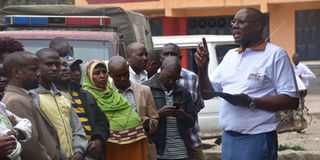Agency assures over census technology

Director General of the Kenya National Bureau of Statistics Zachary Mwangi speaks at the launch of 2019 mock census at Imara Daima, Nairobi, on August 24, 2018. PHOTO | FILE | NATION MEDIA GROUP
What you need to know:
- KNBS chief executive Zachary Mwangi said the technology was tried and tested during the pilot project conducted in August last year.
- The system was developed by both Moi University and Jomo Kenyatta University of Agriculture and Technology.
The Kenya National Bureau of Statistics (KNBS) has assured the country that the technology it will deploy to collect data for the 2019 National Housing and Population Census is foolproof and ready for use.
The exercise — which the agency says will be fully digital in line with the United Nations requirements — will be carried out on the night of August 24/25.
KNBS chief executive Zachary Mwangi on Monday said the technology was tried and tested during the pilot project conducted in August last year.
FOOLPROOFTECHNOLOGY
“We have a foolproof technology system that has an inbuilt quality control and we are sure we will get it right,” Mr Mwangi said during a media breakfast at the Kenyatta International Convention Centre.
He said the agency has been meeting stakeholders to build confidence and urged the political class to support the process, saying the final report will be published on time.
“The use of technology is what the UN has recommended so that data gathering goes together with the requirements established by the Sustainable Development Goals (SDGs) and accompanying targets,” Mr Mwangi said.
“We have tested the programme and we are confident of its capacity to capture, retain and transmit data. We are now at the stage of looking at the emerging risks, trust, safety and the transmission of data,” he said.
DEMOGRAPHICS
The system was developed by both Moi University and Jomo Kenyatta University of Agriculture and Technology and the process of installing the applications is ongoing.
Some of the population characteristics to be collected include demographics, education levels, people living with disabilities, housing conditions, marital status, level of training and the kind of skills in the population and household assets.
Unlike the last census in 2009, Mr Mwangi said the tool the agency will use has a whole module on agriculture and they will be seeking to record any kind of agriculture that is practised in the country.




